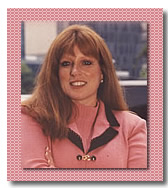
Kathleen Ligocki: Supplying Fresh Ideas to Ford
by
Rachel L. Miller
The
face of the auto industry sure has changed since Kathleen Ligocki
first joined its ranks 23 years ago. Starting out at a Midwestern
GM plant as its only female foreman in the late 1970s, Ligocki has
seen the industry grow and evolve from one that adapted to the dominant
norm to one that embraces choice. And as she takes a step up to
the position of vice president Ford Mexico, Canada and North America
strategy, she discusses her new priorities and comments on how she's
no longer the only woman in the room.
 Don't
blame Kathleen Ligocki for not wanting to leave Mexico. After all,
trading in the country's rich culture, delectable cuisine and temperate
climate for a move to Detroit isn't something most of us would want
to do. And factor in having to abandon a gorgeous house brimming
with antiques — a place that family considers their "private
retreat" — how eager would you be to hop on the next plane
to Michigan?
Don't
blame Kathleen Ligocki for not wanting to leave Mexico. After all,
trading in the country's rich culture, delectable cuisine and temperate
climate for a move to Detroit isn't something most of us would want
to do. And factor in having to abandon a gorgeous house brimming
with antiques — a place that family considers their "private
retreat" — how eager would you be to hop on the next plane
to Michigan?
"I
live like a goddess here and now I have to move back to Michigan
and do my own grocery shopping," Ligocki, 45, says with a laugh.
But
the move will be made worthwhile by the challenges and excitement
of a promotion at Ford Motor Company, for which Ligocki has worked
since 1998. She is stepping up in ranks from CEO of Ford Mexico
(a job she held from January 2000 to July 2001) to the position
of vice president, Canada, Mexico and North America strategy. And
although she's already familiar with Ford's position in Mexico,
she has a new set of goals ready to tackle.
"My
first goal as vice president of North America strategy is to improve
quality, to get product quality where we want it to be," Ligocki said. "We've got to get the business structure going forward,
to get costs in line."
And
as for Mexico and Canada, Ligocki says she will "make sure
both Canada and Mexico's needs are met."
"Really
I look at both as canary markets — things happen there before they
do in the States, so it really keeps your antennae sharp,"
she said.
|
"There
has been a huge change from the days when you were the only
woman in the plant or in the room. It's definitely not equal,
but I'm not alone anymore." |
It's
really quite amazing that Ligocki, who studied Chinese history and
Renaissance art as an undergraduate at Indiana University, ended
up in the auto industry at all, let alone in one of Ford's top leadership
positions. But as Ligocki professes, "I wander from interest
to interest. Every time I think I know what I'm going to do, five
years later I'm doing something else."
If
anyone has lived by following her passions, it's Ligocki, who was
reading Buddhist philosophy during Catechism class and delved into
Mao's Red Book at the age of 9. She grew up in Milwaukee
and moved to Kokomo, Indiana, where she stayed put through her high
school and college years. By then, she had become immersed in her
love of Chinese history.
"I
was intrigued by 10,000 years of history, intrigued by a culture
so different from ours," Ligocki said.
And
as for her other college major, "Renaissance art was pure love.
I couldn't believe that I could get college credit for looking at
paintings. I just studied things I love."
That
love was what first brought her to Mexico. She traveled there after
graduating from college to work on an archaeological dig and discovered
a passion for the people and culture. Then another passion took
hold — she wanted to go to law school.
"I
couldn't get money, though, to go to law school, so I took a job
at a GM plant," she said. "I was the only foreman who
was a college graduate and the only female foreman."
But
like Chinese history and Renaissance art, Ligocki fell in love with
working in the plant.
 "Working
so close together on an assembly line, I found the dynamics to be
very fascinating," she explains.
"Working
so close together on an assembly line, I found the dynamics to be
very fascinating," she explains.
And
it was at that time she found herself a mentor. "My boss was
a visionary at the time. He thought quality was the number one priority
and teamwork would help us achieve the goal. People thought he was
crazy, but he helped turn our area around."
Inspired
by the positive attitude of her boss, Ligocki's career plans changed
indefinitely. "I stayed and kept staying…and 23 years
later I'm still in the business," she said.
Through
the past two decades, Ligocki has seen the number of women in a
male-dominated field jump dramatically.
"There
has been a huge change from the days when you were the only woman
in the plant or in the room," she says. "It's definitely
not equal, but I'm not alone anymore."
She's
also made a wry observation of the absence of what used to be a
tried and true plant favorite.
"There are no pinup posters in the plant anymore," Ligocki
says, laughing. "I used to think that Hustler and Playboy were funded by the plant."
All
joking aside, Ligocki says she's definitely seen an ideological
change in the industry within the past 20 years.
| "[Women
are] half of consumers, we should be half of the business too." |
"When
I joined, it was all about adapting to the dominant norm,"
she she. "The expectation was as a consumer and employee,
you had to adapt to the dominant norm."
Ligocki
adds that the industry is starting to realize that such a view won't
work anymore. "Consumers have so many choices; employees have
so many choices," she explains. "People are thinking,
'I want to be the same person at work that I am at home — and I
want to be comfortable with that person.' "
And
being a female executive in Mexico taught Ligocki a lot about the
advantages women have in business.
"Women
in Mexico work in family businesses, not in multinational corporations
- it's still a novelty there," she said. "But no matter
what culture you're talking about, women listen before projecting
their own needs. It's gives us an advantage and helps us build bridges.
I think that by listening first and not judging and trying to make
it happen, it creates a bond. Being a woman has been easier there
in some ways."
And
even though the auto industry is seeing many more women join its
ranks, it still has a way to go before the industry is balanced,
she said.
 "Jump
right in!" she advises women who are interesting in joining
the field. "We're half of consumers, we should be half of the
business too."
"Jump
right in!" she advises women who are interesting in joining
the field. "We're half of consumers, we should be half of the
business too."
"The
auto industry is a tough business — a very competitive, rough-and-tumble
business," she continues. "You need to be up to the challenge.
The product is very seductive…vehicles touch us in a way few
other products do. If you're not tough when you jump in, you'll
be tough after a while."
A
part of Ligocki's job that's definitely not tough for her is the
travel involved. For someone who has seen 160 countries and whose
goal is to say "I've been everywhere in the world," travel
is definitely a perk of her job.
"If
you stay in the office all the time, the world closes in on you.
So I really spend a lot of time out of the office," says Ligocki,
who is single and has no children. "I work about 70 to 80 hours
a week on average, but it varies. In this job, I'm never in the
office — I travel every week."
Another
passion for Ligocki goes hand-in-hand with travel — learning foreign
languages. She's fluent in French and Spanish (in addition to English,
of course) and has studied Arabic, Chinese and German.
"I
believe if you study a language, you understand how people think
in a different culture," Ligocki said.
It's
a belief that will most definitely help her make the transition
back to Detroit, where the auto industry seems to have a culture
and language of its own sometimes. But there's no doubt her advancement
at Ford will be full of fresh ideas and strategies for the automaker.
And there's definitely no question that Ligocki is ready for whatever
comes next.
"I
love it when everything's new, when everything's a challenge, when
you're working on a learning curve," she says, her fiery passion
and determination becoming more evident with every word spoken.
"I like doing work for people I respect. You can't complain
about stress in the workplace when you have a job that you love."